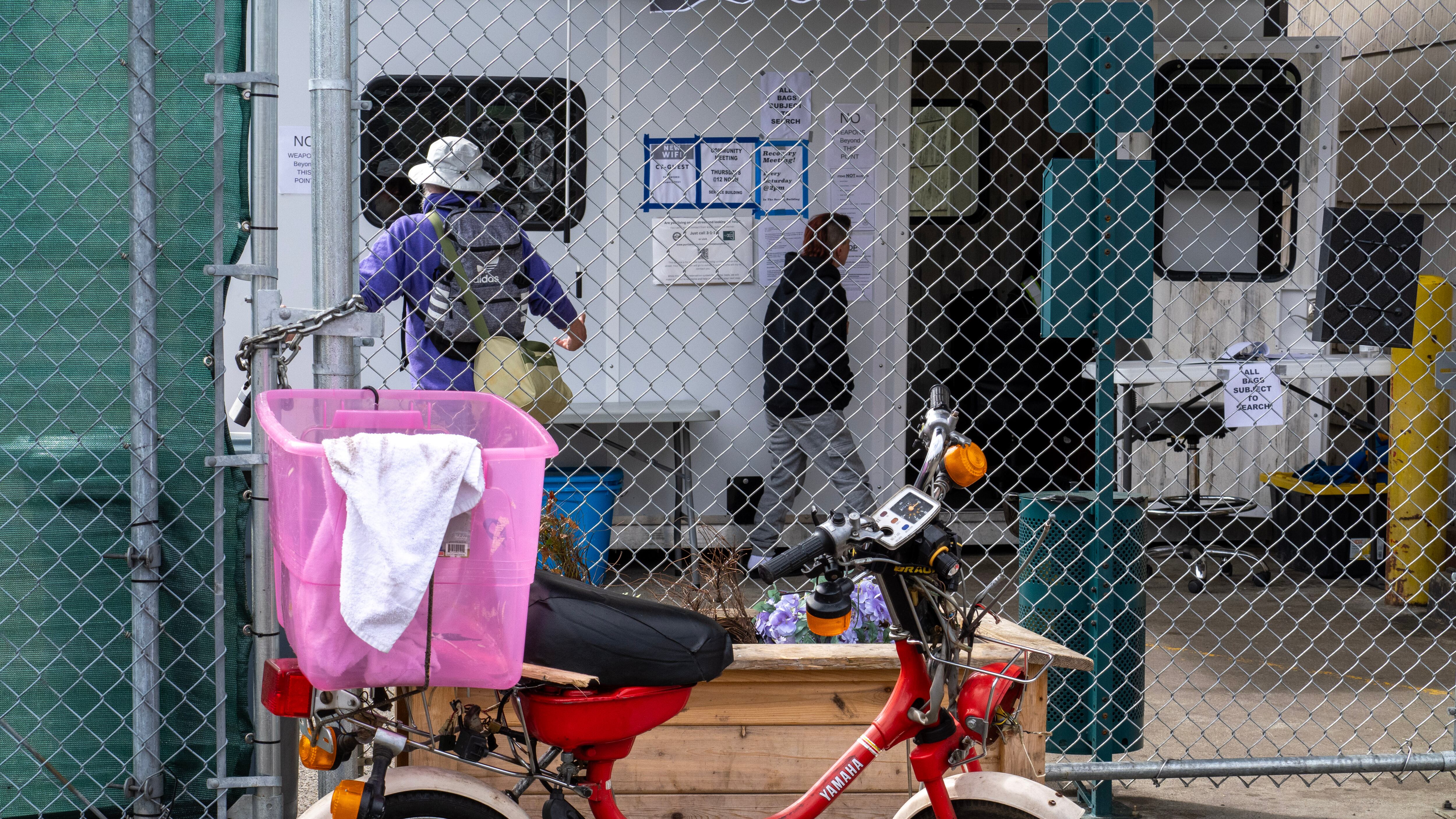The stage was set for Urban Alchemy’s arrival in Portland by a City Council vote in November 2022 to clamp down on unsanctioned camping and create up to six large-scale homeless camps.
The camping ban was later revised to daytime hours, then put on hold by a November 2023 court ruling in a lawsuit filed by homeless advocates.
But a scaled-down plan for larger shelter sites moved forward, drawing two bids—one from a small Vancouver, Wash., nonprofit and a winning bid from San Francisco-based Urban Alchemy, which had already intrigued city officials enough to send a scouting team to visit sites managed by the nonprofit in California.
“Everything we’re doing…is not enough. It’s not sufficient,” Mayor Ted Wheeler said prior to the April 2023 vote to approve the Urban Alchemy contract. “It’s leaving too many people falling through the gaps, particularly people who are chronically homeless. Let’s try it.”
The first of the large shelter sites opened at Clinton Triangle last July under a city contract that pays Urban Alchemy about $100 a day to operate each of the 158 pods and five tents (as of mid-March) situated at the site in Southeast Portland, according to a city official. Urban Alchemy is projected to pull in more than $5 million in first-year operating expenses at Clinton Triangle.
Most of that money pays for the more than 70 Urban Alchemy staff who work at the site for wages that range from $21 an hour to more than $38 an hour for a project director, according to the contract.
The Clinton Triangle deal with Urban Alchemy represents a huge increase from the bare-bones funding that has sustained an earlier generation of Portland homeless villages forged as independent, self-governing communities with residents who chip in expenses, share in chores, and vote on rules.
Dignity Village, founded in 2001, provides shelter for up to 60 people in an eclectic array of housing structures where stays range from a few months to years. The community operates on less than $50,000 a year, with villagers contributing $100 monthly dues. A county-funded position provides staff support, and case management is provided by the nonprofit JOIN, according to Lisa Larson, who chairs the village’s board.
Clinton Triangle’s costs, however, are substantially less per pod than those paid to some Portland nonprofits to manage smaller “safe rest villages.” Multnomah Safe Rest Village, managed by All Good Northwest, currently soaks up about $2.4 million for the annual maintenance and operating costs of 28 living units. That equates to more than $230 a day per pod, according to city officials.
And so far, the Urban Alchemy camps have largely avoided the conflicts with neighbors that have dogged other villages.
Since Clinton Triangle opened in July, community relations have been bolstered by outreach to neighborhood groups to listen to their concerns and forge a 35-page “good neighbor” agreement that details how they will be addressed. Representatives of three of the groups meet biweekly with city and Urban Alchemy officials.
The ongoing dialogue has helped reduce the scope of conflicts that have dogged sites operating in other parts of the city like Southwest Portland, where a coalition of neighbors has demanded increased safeguards before the Multnomah Village shelter site is allowed to expand from 30 to 100 pods.
For neighborhood groups, reducing unsanctioned camping in tents and vehicles is one of seven measures for evaluating “the community success” of Clinton Triangle, according to the good neighbor agreement signed with the city.
The city is monitoring progress toward this goal by tracking unsanctioned camps within the neighborhoods. Tracking through November shows a modest increase in the number of unsanctioned encampments. Still, some neighborhood representatives see improvement.
“There is a lot less visible camping in places where it just seemed ubiquitous,” says Christopher Eykamp, chair of the Hosford-Abernethy Neighborhood Association. “It’s not a huge shift, but a trend in the right direction.”
In the Central Eastside, business owners say city officials are responsive when they report unsanctioned encampments. Yet, in some areas, the size of the camps has grown, often on swaths of land with shared jurisdiction, such as right of way owned by the Oregon Department of Transportation. And break-in thefts continue to take a toll on property owners, many of whom have made big investments in security.
“We have so much activity in the district right now. We’re seeing an uptick in the amount of camps and debris and trash that is accumulating,” says Carolyne Holcomb, executive director of the Central Eastside Industrial Council.
Holcomb says some of this growth likely stems from migration of campers uprooted from downtown by intensified sweeps and—more recently—a 90-day emergency declared to crack down on open-air fentanyl use.
